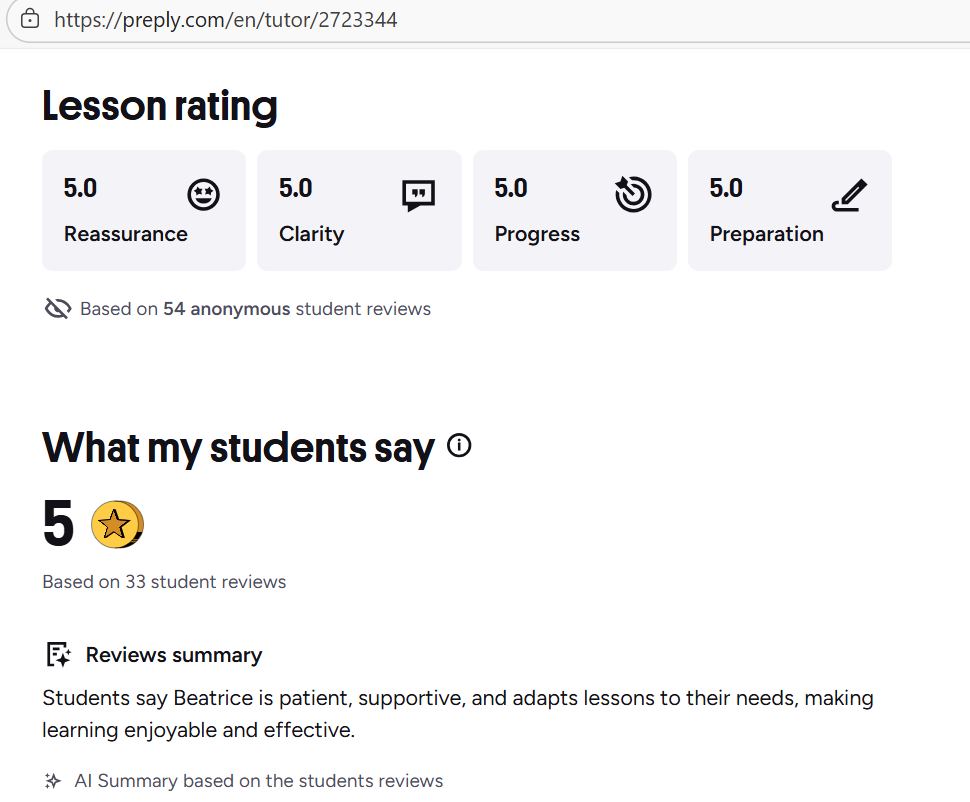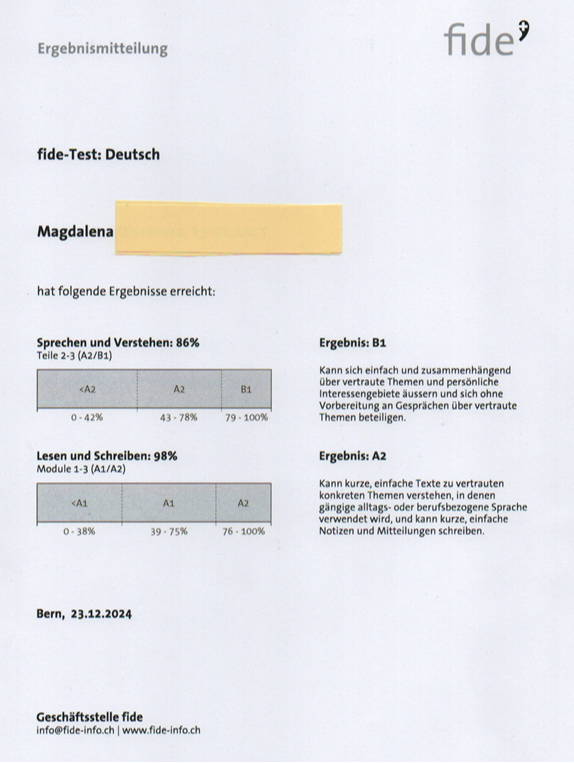Benefits and Learning Tips on Der, Die, Das
Jul 30, 2025
Why Do I Write This Blog About the Genders of German Nouns?
Because it is important to me that you understand the foundation of the German language well, that you can speak and write confidently, and most importantly that you enjoy learning the German language, culture, and history. 💡🎉🌟
Benefits and Learning Tips on Der, Die, Das
- Make a difference in everyday situations for your family and yourself as you speak and write more confidently when knowing the genders of German nouns correctly. Good, fundamental, basic knowledge is key to success in German. If you are able to communicate more fluently and confidently, you can make an impact on yourself, your loved ones, and people you communicate with.
- Stand out in job interviews, at work, in everyday life, and when traveling. If you have a good, fundamental skill of der, die, and das, it is easier to be seen as somebody who learns and knows the German language well. You get more acknowledgement, authority, respect, and money.
- It is much easier to live a good life in a German-speaking country when you learn the basics like the genders of German nouns, and then speak and write German better and more confidently.
- Save time by learning the genders of German nouns correctly from the start. Don’t save it for later. It is too important, and the effort you do in the beginning saves you time later. Learn consistently every day for ten to fifteen minutes, and you will see successes.
💡TIP: Learn a new noun in German always with the right article.
Use colors:
Blue for the masculine gender der: der Baum = the tree
Red for the feminine gender die: die Blume = the flower
Green for the neuter gender das: das Gras = the grass
Black italic or black underline for the plural, always with the article die: die zwei (2) Bäume = the two trees🌳🌳 / die Bäume = the trees
- Every noun in German has either the article der, die, or das. It is like the foundation walls of a house. Make sure that you have good and strong foundation walls; they are key to success. Learn the genders correctly from the start, and revise and practice them regularly.
There are some proven insider tips for learning der, die, and das efficiently:
Learn the basic, most fundamental rules within 5 days:
- Learn masculine nouns with the gender DER (further down, you find an overview with some important rules about the genders) on the 1st day.
- Learn feminine nouns with the gender DIE on the 2nd day.
- Learn neuter nouns with the gender DAS on the 3rd day.
- Learn the plural always with the gender DIE on the 4th day.
- Repeat everything on the 5th day and thereafter whenever and wherever you have time.
For me, it is always helpful to learn for ten to fifteen minutes every evening before sleeping.💫 If possible turn off all distractions during your time of learning, repeating, and practicing.
If you put everything into action, you will see progress soon, but also be patient with yourself if you can’t remember all new words. Learning a language comes with learning, repeating and practicing.
Take action now and start with my free workbook:
Celebrate your small, and of course bigger, successes. 🎉
Overview on Some Rules on Der, Die, and Das:
Nouns with the masculine gender DER:
All male persons: 👨
der Mann = the man
der Sohn = the son
der Vater = the father
Ending of male German professionals: 👨 🛠️ -loge, -eur
-loge
der Meteorologe = the male meteorologist
der Archäologe = the male archaeologist
-eur
der Ingenieur = the engineer
der Installateur = the plumber
All cardinal points are masculine: 🧭
der Norden = the north
der Süden = the south
der Westen = the west
der Osten = the east
Endings of German nouns:
-tor, -ling, -ig, -ner, -rer, -ich, and-ismus
- -tor : der Direktor = the director
- -ling : der Lehrling = the trainee
- -ig : der König = the king
- -ner : der Gärtner = the male gardener
- -rer : der Lehrer = the male teacher
- -ich : der Teppich = the carpet
- -ismus : der Optimismus = the optimism
Nouns with the feminine gender DIE:
All female persons, except for Mädchen (girl) are feminine and have the gender DIE: 👩
die Frau = the woman
die Mutter = the mother
die Tochter = the daughter
Das Mädchen has the ending -chen and therefore the article is “das” and not “die”.
Die Mädchen are the plural of Mädchen. 👩 👩
For example: die zwei (2) Mädchen = the two girls.
Ending of female German professionals or female persons: 👩 🛠️ -login, -erin and -in
-login
die Meteorologin = the female meteorologist
die Archäologin = the female archaeologist
-erin
die Lehrerin = the female teacher
die Amerikanerin = the female American
-in
die Studentin = the female student
die Touristin = the female tourist
Difference between female and male professionals and people: 👩 👨
die Meteorologin = the female meteorologist 👩
der Meteorologe = the male meteorologist 👨
die Lehrerin = the female teacher
der Lehrer = the male teacher
die Amerikanerin = the female American
der Amerikaner = the male American
die Studentin = the female student
der Student = the male student
Most fruits are feminine nouns : 🍇
die Traube = the grape
die Erdbeere = the strawberry
die Himbeere = the raspberry
die Kirsche = the cherry
but = aber der Apfel = the appel
Nouns with the neuter gender DAS:
das Kind = the child 👶
das Tier = the animal 🐕
Endings of German nouns: -chen, -lein, -ment, -eum and -ium
- -chen : das Gärtchen = the small garden
- -lein : das Büchlein = the small book
- -ment : das Instrument = the instrument
- -eum : das Museum = the museum
- -ium : das Studium = the accademic studies
All verbs when they are used as nouns:
schwimmmen = to swim / das Schwimmen = the swimming
Das Schwimmen ist gut für die Gesundheit. = Swimming is good for health.
lesen = to read / das Lesen = the reading
Das Lesen ist interessant. = Reading is interesting.
lernen = to learn / das Lernen = the learning
Das Lernen macht Spass (Spaß)* = Learning is fun.
*Spass = fun - In Switzerland Spass is written with two s.
*Spaß = fun – In Germany Spaß is written with ß.
Often, words that begin with the letters Ge-:
das Gebäude = the building
das Getreide = the cereal
das Geschenk = the gift
das Gehirn = the brain
das Geheimnis = the secret
das Gedicht = the poem
but = aber die Geschichte = the story, the history
Often, words from other languages than German:
das Auto = the car
das Handy = the cellphone, the mobile phone
das Thema = the topic
das Meeting (das Treffen) = the meeting
das Internet = the internet
but = aber der Computer = the computer
Nouns in plural, always with the gender DIE:
The plural of German nouns always has the gender DIE, even if the noun is masculine or neuter in the singular. 😊 😊😊
die Frau = Singular = the woman 👩
die Frauen = Plural = the women 👩 👩
der Mann = Singular = the man 👨
die Männer = Plural = the men 👨 👨
das Kind = Singular = the kid/the child👶
die Kinder = Plural = the kids/the children 👶 👶
If you want to go deeper and make the quick win of the free 5-Day Workbook into sustainable, lasting learning of Der Die Das check out my online course.
👉 Der Die Das in 7 Days - The Fast Track to Gender Confidence 🎯🧘♀️
Testimonials from Customers I Supported in Their German Learning Journey: 🎯🎉💫
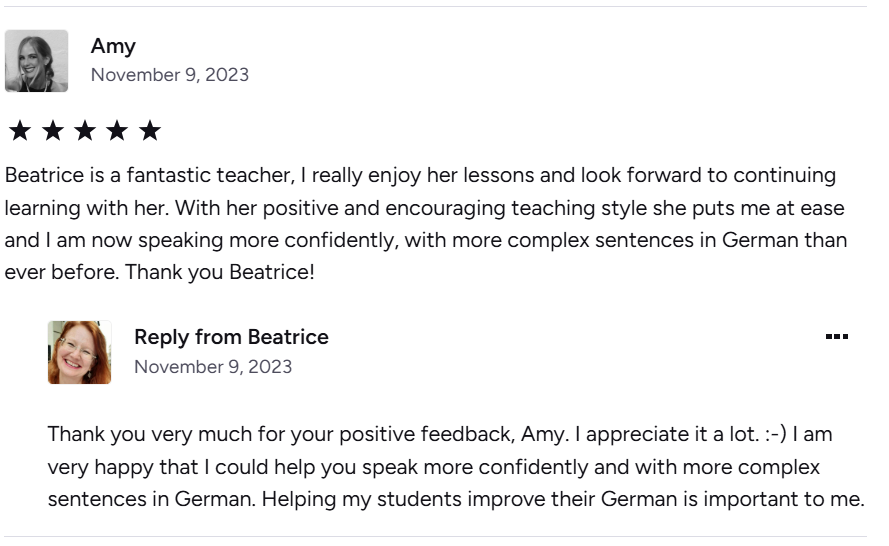
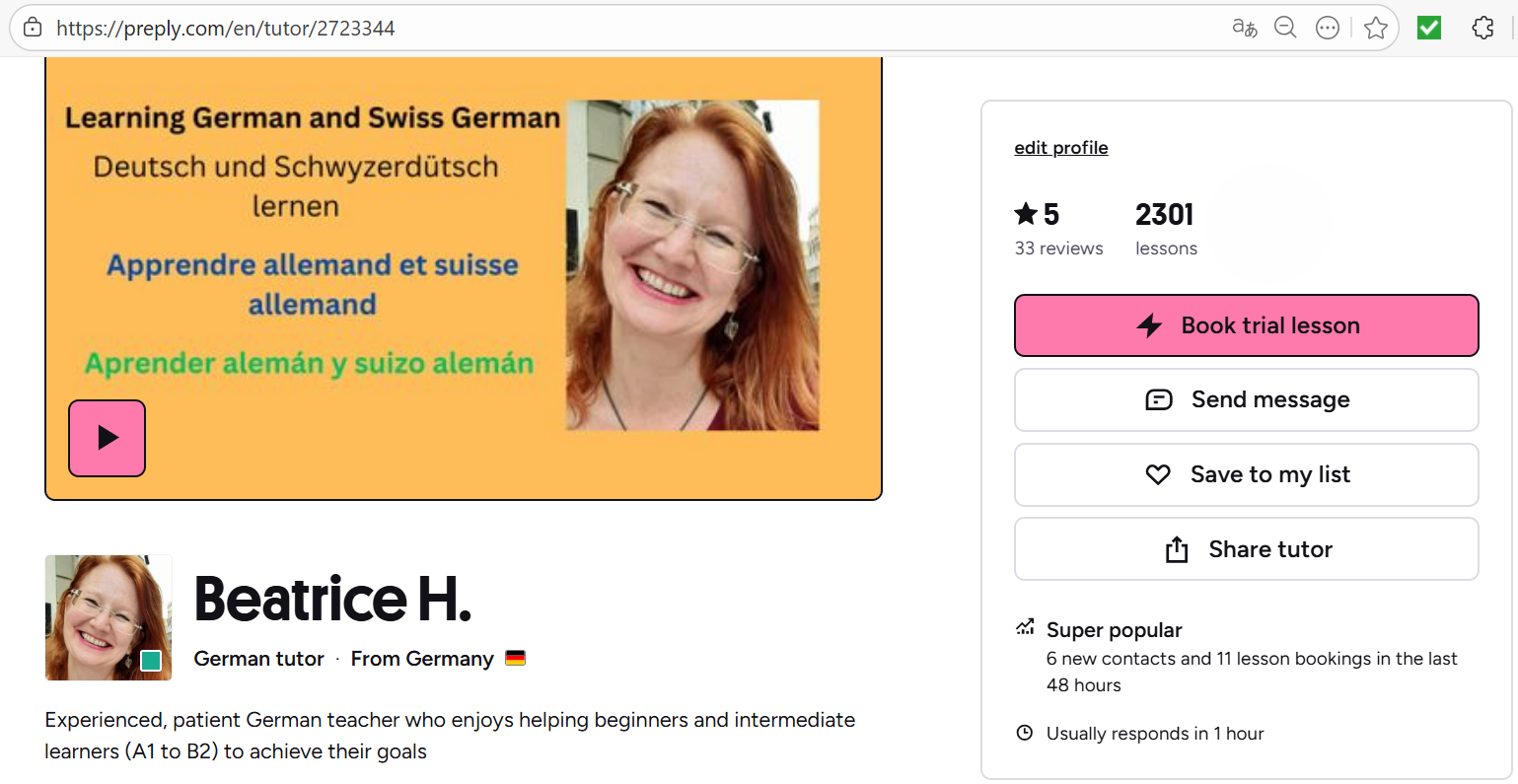

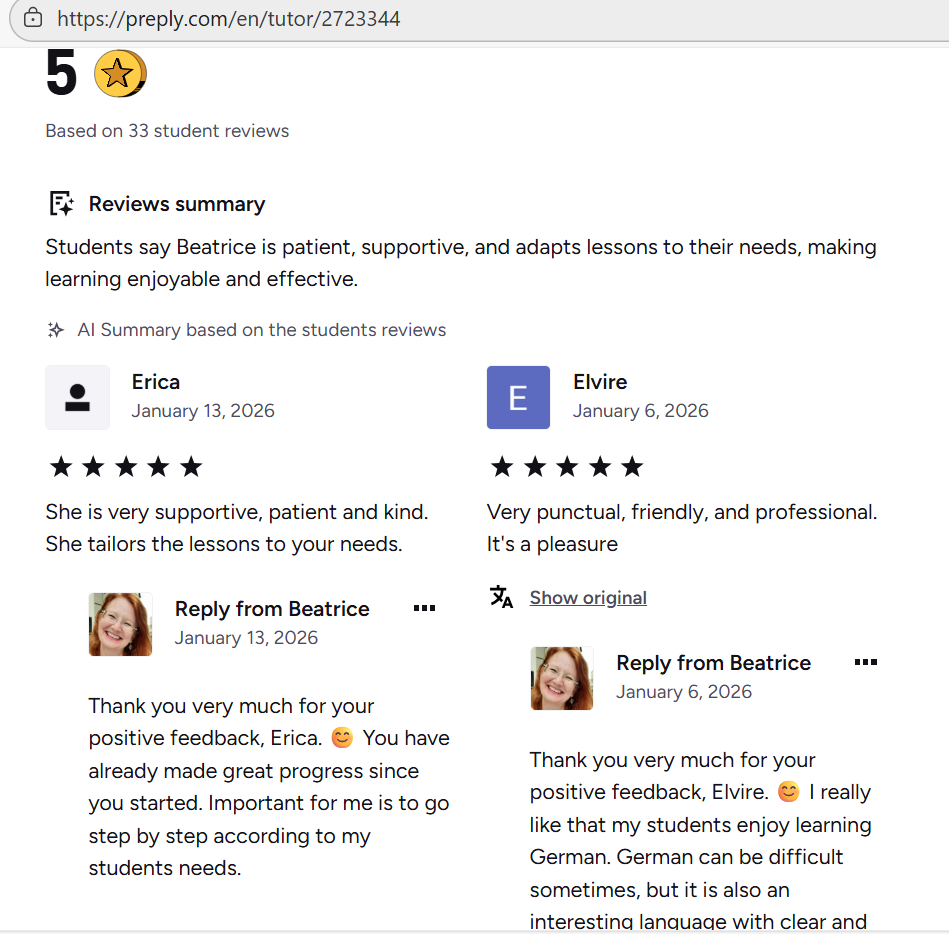
2 ambitious German learners who purchased
Der Die Das in 7 Days - The Fast Track to Gender Confidence 🎯🧘♀️
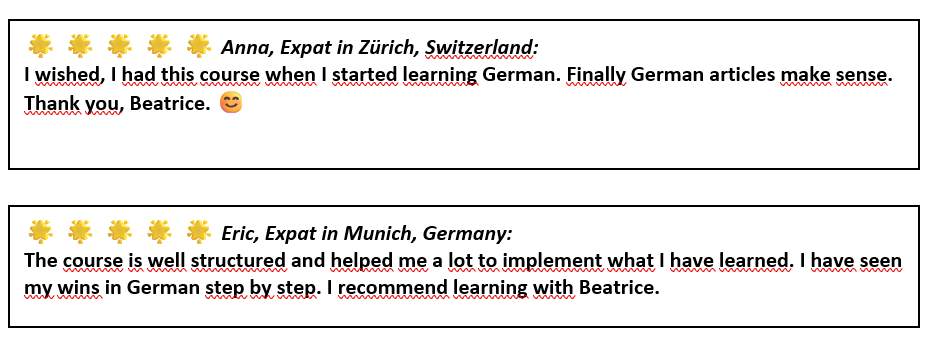
The Method Behind My Students' Successes:🎉💫
Learning German can be calm, focused, and truly enjoyable — when you have the right roadmap, mindset, and support.
One of the biggest challenges for German learners is mastering der, die, das.
That’s why I created
Der Die Das in 7 Days — The Fast Track to Gender Confidence 🎯🧘♀️
It’s the same proven method I use with my students to help them learn efficiently, sustainably, and with calm focus.
Here’s what you’ll get:
- ☑️ Proven insider tips for learning der, die, das in just 7 days.
- ☑️ Clear, simple explanations in both German and English.
- ☑️ 10 practical exercises (with solutions and explanations) to build confidence.
- ☑️ A mindful meditation video to support relaxed, focused learning.
- ✅ Bonuses: 20 useful nouns, a secret learning strategy, a checklist to keep you on track, and a little introduction into the Swiss German articles de, t, and s (der, die, and das).
🎯 Save time, money, and energy while learning smarter — not harder.
Your Own Success Story Starts Here 💫🎉😊
With the right roadmap, motivation, and mindset, you can achieve your German goals — whether that’s passing your exam, landing a job, or simply feeling at home in everyday conversations.
Start small, stay consistent, and celebrate your progress.😊
As the famous German writer Johann Wolfgang von Goethe once said:
✨„The greatest thing in this world is not so much where we stand, as in what direction we are moving.„ ✨ - Johann Wolfgang von Goethe
Every word you learn brings you closer to confidence. ✨
Keep Learning with Me
For more weekly tips on learning German with clarity and calm, subscribe to my free newsletter below.
📩You’ll get exclusive advice on der, die, das, German grammar, and smart learning strategies — straight to your inbox.
#LearnGendersOfGermanNouns #LearnDerDieDas #LearnGermanGrammar #LearnGermanForExpats #LearnGermanFast
Your data are treated confidently, and only used by Deutsch A Beatrice.







